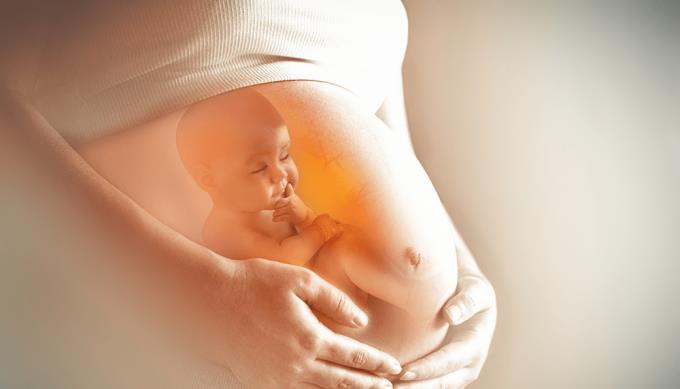Listening to loud music affects the fetus a lot. Pregnant women who are constantly affected by noise have a higher risk of preterm birth and when they are born, their baby is more likely to experience hearing problems.
Music is shown to be effective in stimulating the brain and good for the development of the fetus. However, pregnant women who listen to music too loud or are frequently exposed to loud noises will have a negative effect on their baby's hearing. So how does loud sound affect the fetus? Let aFamilyToday Health follow the following shares to understand more about this.
When does the baby start to hear sounds?
Around the fifth month of pregnancy, your baby will hear the first sounds as the hearing organs are maturing. Your baby can hear noises you don't notice like heart beating, air moving through lungs ...
The bigger the baby, the clearer the sound will also become. Between 25 and 26 weeks, the fetus is likely to respond to voice and noise. At this point, you can hear the thumping in your stomach every time you are exposed to loud sounds.
When in the womb, will your baby be protected from the harmful effects of noise?
The fetal hearing organs are protected by the abdominal muscles, placenta and amniotic fluid. Therefore, the outside sounds that the baby hears while in the womb will be lower volume than real sounds.
However, it is still not possible to determine exactly how loud sounds will be dangerous to your baby, so it's best to be cautious when listening to music and limit to noisy places like concerts. , fair…
Additionally, loud noises can have a negative effect on the mother as it can promote the production of stress hormones . These hormones can increase the mother's heart rate, which will have a negative effect on the baby in the abdomen.
What types of sounds are dangerous for mother and baby?
Long-term exposure to loud noises can cause hearing loss in the fetus. Therefore, to protect your baby, it is best to pay attention to the following:
Don't go to the shooting range or practice shooting.
Limit participation in music concerts. If you intend to participate, avoid sitting in the front row.
Do not work in areas where noise is higher than 80 decibels.
When listening to music, do not hold the headset against your stomach.
How loud sounds affect the fetus?

Loud noise can cause problems for the fetus such as:
1. Startled your baby
Exposure to loud sounds can startle the baby. When you listen to music at high volume, you'll see your baby move more in the abdomen or your baby has more intense movements.
2. Affecting the hearing of the fetus
Loud sounds can affect your baby's hearing. Humans can tolerate sounds at around 80 decibels, and regular exposure to sounds above this threshold can damage hearing. Sounds in concerts, machine sounds can have frequencies higher than 80 decibels, so these types of sounds can harm your baby's hearing.
3. Causing birth defects
Many studies show that if pregnant women are constantly affected by noise, they have an increased risk of preterm birth , low birth weight and their baby is more susceptible to hearing problems at birth.
Not only that, a study in the United States on the effects of noise on the fetus has published results that the rate of malformed babies increased from 0.8 to 1.2%. The reason is that loud noise can cause pregnant women to have high blood pressure, which directly affects the development of the fetus, leading to birth defects such as spina bifida , brain defects ... It can also affect the baby's motor skills development in the future.
4. Causes stress in a newborn
Scientists have done a few studies in monkeys and rats and found that frequent exposure to loud noises can increase fetal cortisol and corticotropin levels. The more these hormones increase, the more likely a baby will become stressed after birth. However, there are currently no studies that show that loud noises can stress the developing fetus.
5. Alter the brain structure of fetus
A few animal studies have shown that loud noises can cause changes in the fetal brain structure. Although no studies have been done in humans, you should try to avoid exposure to loud sounds during pregnancy.
6. Increased risk of preterm birth
There are many reasons why babies are born before their due date, and exposure to noise is one of them. According to studies, pregnant women regularly exposed to loud noises can reduce pregnancy duration from 40 weeks to 37 weeks.
Should the fetus listen to soft music or not?

Pregnant women listen to music too loudly can affect the development of the fetus, this will make you wonder if you do not know whether to let your baby listen to music or not. Researchers all agree that listening to music can bring many benefits for both mother and baby as long as you listen to lower volume or within allowed limits.
Soothing music can have a positive effect on both you and your baby. When listening to music, you will feel comfortable, less stress, this has a positive effect on the development of the fetus in the abdomen.
Don't try to listen to music you don't like just because people say it's good for the fetus. Instead, listen to music you love, this will help your brain cells relax, thereby increasing the amount of endomorphins circulating in the blood, helping the nerve cells of the fetus grow. In addition, you should also avoid listening to music with too strong rhythms and changing the rhythm continuously because these music will not be good for your baby.
Currently, scientists are still conducting research to determine the harm of loud noises on the fetus. Before these results are published, you should still avoid exposure to loud sounds during pregnancy.













